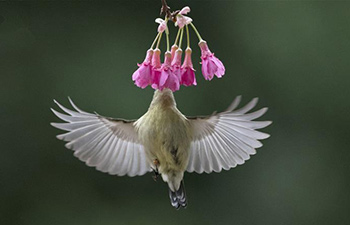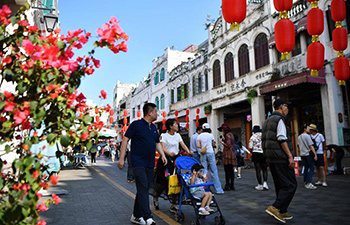
Photo provided by Bill & Melinda Gates Foundation shows that Bill Gates (R) and Melinda Gates pose for a photo after annotating the 2019 annual letter in Kirkland, Washington, the United States, on Jan. 8, 2019. Bill and Melinda Gates released their 2019 annual letter on Feb. 12 and a video speech was exclusively broadcast via Xinhua. Bill Gates, co-chair of the Bill & Melinda Gates Foundation, said Tuesday that exciting progress against poverty and disease around the world has been made in 2018, and China has been a major contributor to this progress. Bill Gates has called for strengthened investment in innovation in key areas so that related industries can continue to develop without worsening climate change. In their 2019 annual letter, Bill and Melinda Gates shared nine things that have surprised them over the course of their nearly two decades of work together in global health and development. (Xinhua)
NEW YORK, Feb. 12 (Xinhua) -- In their 2019 annual letter released Tuesday, Bill and Melinda Gates shared nine things that have surprised them over the course of their nearly two decades of work together in global health and development.
In the letter entitled "Things We Didn't See Coming," Bill and Melinda discussed surprises that both worry and inspire them, and observed that surprises are often powerful calls to action.
"Twenty-five years ago, we read an article that said hundreds of thousands of kids in poor countries were dying from diarrhea. We believe in a world where innovation is for everyone -- where no child dies from a disease it's possible to prevent. But what we saw was a world still shaped by inequity," write Bill and Melinda Gates. "That discovery was one of the most important steps in our journey to philanthropy."
Surprises in this year's letter address topics including the importance of investing in Africa's growing population of young people, sources of greenhouse gas emissions that don't get enough attention, the reasons data can be sexist, and the nationalist case for globalism.
The Gates said the year 2018 was not like what they've expected. "From especially devastating natural disasters on the one hand to record numbers of women campaigning for office on the other, 2018 felt to us like a series of surprises. The world looking backward from today is very different from what we pictured a couple years ago looking forward."
A benefit of surprises is that they're often a prod to action. It can gnaw at people to realize that the realities of the world don't match their expectations for it. Some surprises help people see that the status quo needs to change. Some surprises underscore that transformation is happening already, according to the letter.
Talking about climate change, Bill Gates said people should better understand sources of greenhouse gas emissions, referring to one surprise that agriculture accounts for 24 percent of greenhouse gases, including cattle which give off methane when they belch and pass gas, while electricity accounts for a quarter of all emissions and manufacturing accounts for 21 percent.
"The larger point is that if we're going to solve climate change, we need to get to near-zero emissions on all the things that drive it -- agriculture, electricity, manufacturing, transportation, and buildings. I call these five areas the grand challenges in climate change," he said.
He said it's not realistic to think that people will simply stop using fertilizer, running cargo ships, building offices, or flying airplanes. Nor is it fair to ask developing countries to curtail their growth for the sake of everyone else. For example, for many people in low- and middle-income countries, cattle are an essential source of income and nutrients.
"Part of the solution is to invest in innovation in all five sectors so we can do these things without destroying the climate. We need breakthrough inventions in each of the grand challenges," he said.
When discussing nationalism and globalism, Melinda Gates said she and her husband love their country and "believe in what it stands for."
"We agree that our leaders have a duty to protect it. And for all of those reasons, we consider global engagement our patriotic duty," she said.
"There is nothing about putting your country first that requires turning your back on the rest of the world. If anything, the opposite is true," she said.
The Gates also talked about how technological advancement has made textbooks obsolete, the importance of toilet innovation, and how powerful when mobile phones are in the hands of the world's poorest women.
The Gates stressed their optimism about the future. "One reason is that we believe in the power of innovation. But an even bigger reason is that we've seen firsthand that for every challenge we've written about in this letter, there are people devoting their ideas, their resources, and even their lives to solving them."
"When we're feeling overwhelmed by negative headlines, we remind ourselves that none of us has the right to sit back and expect that the world is going to keep getting better. We have a responsibility to do everything we can to push it in that direction."
"We've found that optimism can be a powerful call to action. And it has a multiplier effect: The more optimists there are working for a better future, the more reasons there are to be optimistic," the letter concludes.










